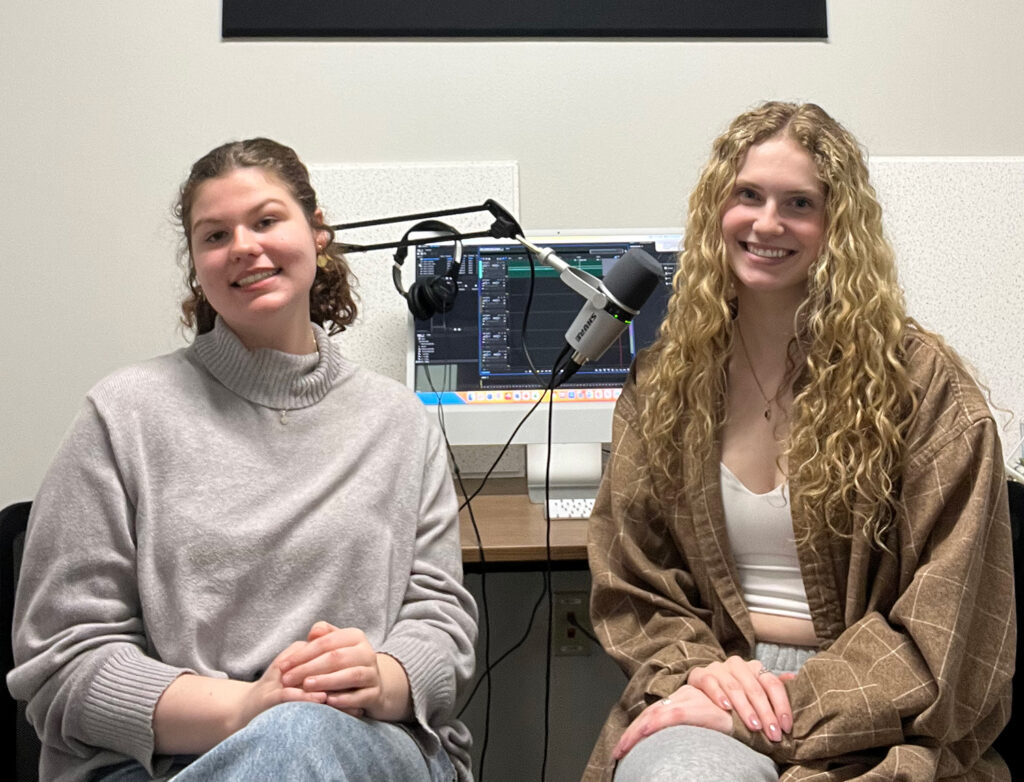
UW-La Crosse art students Carlyn Farrow and Abby Eftemoff pose for a photo at UWL’s Communication & Media Lab. Both students were part of a ART: 215 “Introduction to Museum Studies” class that developed audio guides for select artworks at the Minnesota Marine Art Museum (MMAM) in Winona. (Courtesy of Sierra Rooney, associate professor of art, UWL)
Art students from UW-La Crosse are lending their talents to make art more accessible at the Minnesota Marine Art Museum (MMAM) in Winona. Students in the ART: 215 “Introduction to Museum Studies” class developed audio guides for select artworks featured in the museum’s upcoming marine art exhibition, “Fluid: What is Marine Art and What Can It Be,” opening Saturday, May 18. The audio guides will be available to access alongside the art and also available anytime on Sound Cloud.
These audio guides aim to make the museum experience more engaging for all visitors, and particularly those who are blind or have low vision. Instead of simply describing the artworks, students learned to use descriptive, non-visual language that conveys the essence of each piece in their audio recording. They received guidance from resources developed by Art Beyond Sight, an organization promoting accessibility in the arts, to ensure their descriptions were inclusive, explains Associate Professor Sierra Rooney who teaches the class.
Museum staff say the audio tours are meaningful for their mission, offering enhanced understanding, accessibility, flexibility, personalization, and an overall enriching experience.
“Historically, museum audio tours showcase a ‘top-down’ approach with an art authority speaking to the visitor,” says Heather Casper, curator of Engagement, Learning and Impact at the museum. “Working with UWL students, we are able to offer our visitors the same supported information with a fresher student perspective. I’m looking forward to seeing what our visitors think about the conversational format of these audio tours.”
Blending career prep and museum wonder
The project was a win, win as students also benefited in preparing for future careers.
“As a future educator in the art field, I greatly appreciated this project’s ability to help me become more comfortable conversing about artwork and the impact it can create,” says UWL Art Education Major Jayda LaFleur.
Breielle Thompson, also an Art Education major, enjoyed the collaborative work between students and MMAM staff to ensure the guides were effective for all visitors. The project involved discussing the art’s historical context and themes in a conversational style, adding depth to the visitor experience.
“For instance, we were not just simply using color to relate what something looked like, since some listeners have never seen colors,” explains Thompson. “Instead, they wanted us to use narration to say what was happening, to make the listener feel as if they were in the piece themselves.”
UWL Political Science Major Brianna Bauch says the project showed her how effective an audio guide can be at conveying information to someone who can’t see the subject. “It was rewarding to be able to provide an equally valuable and enjoyable museum experience to all who attend,” says Bauch.
Students visited MMAM at the beginning of the semester to talk with Casper and Dave Casey, director of Engagement, about the exhibition and artworks, and to see the gallery space where the audio guides will be used. They also used UWL resources to complete the project. They attended a library instruction at UWL’s Murphy Library where they learned how to research artworks. Students recorded and edited their guide at UWL’s Communication & Media Lab (CaML).
Students said the collaborative nature of the project, involving small teams to research, write, record, and edit the audio guides, taught them a lot about leadership and teamwork.
“A well-meshed group project contains people of all talents, and each talent has its own usefulness and time to shine,” says Kaley Lutker, a double major in Archaeology and Art. “This project would’ve been completed at a fraction of the skill if I had been doing it alone.”
UWL Art Education Major Austin Anderson says he improved his technical recording skills working in the audio labs on campus, as well as leadership skills working with in his group. “Part of those leadership skills were the ability to develop delegation skills and team analysis skills to have my team do the best we could with the skills we have,” says Anderson.
History and Art History Major Lila Houwers says overall the experience solidified her career interest working with exhibitions in an art museum.
“Having this experience of analyzing a work and creating an audio guide for it allows me to form a brief understanding of what my future could look like if I choose to pursue this career path,” says Houwers. “I know that for me personally, having this experience solidified my interest in working with art, and I plan to follow this path the whole way through.”
A Community Engaged Learning class project
Rooney received a faculty development grant, the Teaching Innovation Grant, to develop this community-engaged class project with the Minnesota Marine Art Museum during the spring semester. Her course is currently one of 33 classes that have the official Community Engaged Learning designation.
This designation is given to instructors who incorporate community projects into their class curriculum providing students with real-world problems while meeting the needs of community partners. To learn more about the Community Engaged Learning program at UWL and how classes can obtain the designation, visit UWL Community Engagement.
If you go
What: UWL student-produced audio guides for artwork in the “Fluid: What is Marine Art and What Can It Be” exhibition. The MMAM new gallery experience explores the genre of international marine art.
When: The exhibition opens Saturday, May 18. Free admission on Thursdays to all students.
Where: Minnesota Marine Art Museum. Find information on hours, admission and location.
Written by UW-La Crosse University Marketing & Communications
Link to original story: https://www.uwlax.edu/news/posts/engaging-with-art-beyond-sight/
